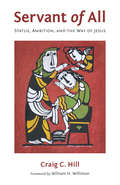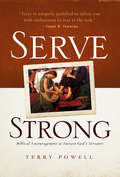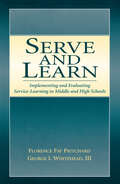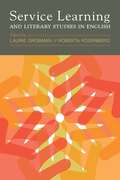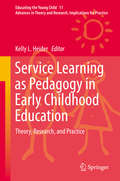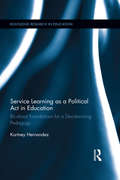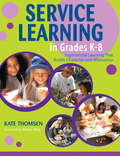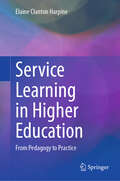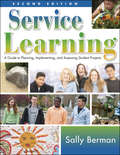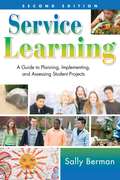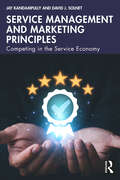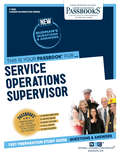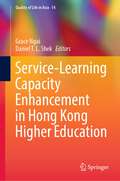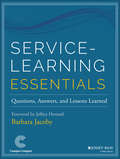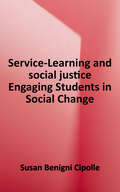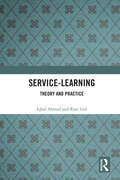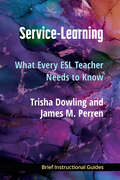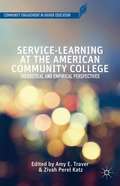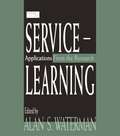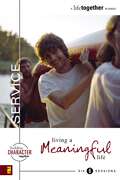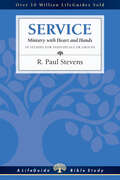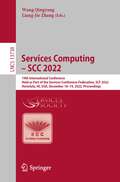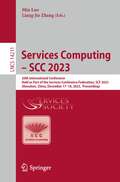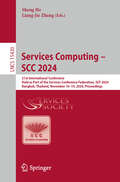- Table View
- List View
Servant of All: Status, Ambition, and the Way of Jesus
by Craig C. HillThere exists a deep tension between the biblical view of servant leaders and the status that Christian leaders today often desire and pursue. Many pastors and other church leaders, like it or not, struggle with ambition. In this book Craig Hill shows how the New Testament can help Christian leaders deal with this problem honestly and faithfully. Hill examines such passages as the Christ Hymn in Philippians 2 to show how New Testament authors helped early Christians construct their identity in ways that overturned conventional status structures and hierarchies. Status and ambition, Hill says, are not often addressed forthrightly in the church, as Christians either secretly indulge those impulses or feebly try to quash them. Hill'sServant of All will help Christian leaders reconcile their human aspirations and their spirituality, empowering them to minister with integrity.
Servant of All: Status, Ambition, and the Way of Jesus
by Craig C. HillThere exists a deep tension between the biblical view of servant leaders and the status that Christian leaders today often desire and pursue. Many pastors and other church leaders, like it or not, struggle with ambition. In this book Craig Hill shows how the New Testament can help Christian leaders deal with this problem honestly and faithfully. Hill examines such passages as the Christ Hymn in Philippians 2 to show how New Testament authors helped early Christians construct their identity in ways that overturned conventional status structures and hierarchies. Status and ambition, Hill says, are not often addressed forthrightly in the church, as Christians either secretly indulge those impulses or feebly try to quash them. Hill'sServant of All will help Christian leaders reconcile their human aspirations and their spirituality, empowering them to minister with integrity.
Serve Strong: Biblical Encouragement to Sustain God's Servants
by Terry PowellServe Strong helps volunteers as well as vocational Christian workers combat discouragement, persevere through weariness, and cultivate endurance for the long haul.Serve the Lord long enough and discouragement or some form of opposition is inevitable. Joy-sapping workloads, feelings of inadequacy, lack of fruitfulness, or battle fatigue from spiritual warfare often spurs God's servants to quit or sabotages their passion. The purpose of this book is to infuse them with biblical perspectives that buoy flagging spirits, boost motivation, and cultivate endurance.
Serve and Learn: Implementing and Evaluating Service-learning in Middle and High Schools
by Florence Fay Pritchard George I. Whitehead, IIIThis volume makes two important contributions: First, it provides a framework grounded in theory and best professional practice that middle and high school teachers, their students, and community partners can use to design, implement, and evaluate service-learning projects that address authentic community needs. Second, it demonstrates ways collaborative service-learning can enhance students' intellectual development, promote their academic achievement, strengthen their citizenship skills, and accelerate the kinds of educational accountability and reform initiatives emphasized in the national educational standards movement, and the 2002 No Child Left Behind Act. Serve and Learn: Implementing and Evaluating Service-Learning in Middle and High Schools: *provides what may be the only comprehensive guide to implementing, assessing, and celebrating service-learning in today's middle and high schools; *emphasizes and explicates a collaborative approach to service-learning in which teachers, students, and community partners team together to advance learning and meet genuine community needs; *demonstrates how service-learning teams use key elements of standards-based education, multiple intelligences theory, and cooperative learning to guide project development, implementation, assessment, and evaluation; *offers optional designs for service-learning projects that are suitable for use by interns and beginning teachers, as well as by experienced and master teachers, and that can be used in a developmental sequence by school and community partners to build from small, individual projects toward school, system, and community wide projects; and *includes end-of-chapter activities that help those who use the book as a text to practice the model and its strategies, and use results to create their own service-learning projects. The book is organized in three parts that present service-learning along a theoretical to practical continuum. Part I lays the foundations for the method by proposing a collaborative model for service-learning. Part II explicates this model and explains the four sets of processes that teams use to commit to a project, cooperatively determine students' project outcomes and ways to measure them, develop learning activities to help students achieve outcomes, and then evaluate their projects and celebrate growth. Part III provides resources for carrying out the collaborative model. A wide range of educators will find this book useful. Its distinctive contributions and features are particularly valuable for teacher educators, students, and community partners already committed to service-learning projects; to those who are introducing service-learning into their practice; and to instructional supervisors, school administrators, and community agencies seeking to create a climate for service-learning or to enrich initiatives already underway.
Service Learning and Literary Studies in English
by Laurie Grobman and Roberta RosenbergService learning can help students develop a sense of civic responsibility and commitment, often while addressing pressing community needs. One goal of literary studies is to understand the ethical dimensions of the world, and thus service learning, by broadening the environments students consider, is well suited to the literature classroom. Whether through a public literacy project that demonstrates the relevance of literary study or community-based research that brings literary theory to life, student collaboration with community partners brings social awareness to the study of literary texts and helps students and teachers engage literature in new ways.In their introduction, the volume editors trace the history of service learning in the United States, including the debate about literature's role, and outline the best practices of the pedagogy. The essays that follow cover American, English, and world literature; creative nonfiction and memoir; literature-based writing; and cross-disciplinary studies. Contributors describe a wide variety of service-learning projects, including a course on the Harlem Renaissance in which students lead a community writing workshop, an English capstone seminar in which seniors design programs for public libraries, and a creative nonfiction course in which first-year students work with elderly community members to craft life narratives. The volume closes with a list of resources for practitioners and researchers in the field.
Service Learning as Pedagogy in Early Childhood Education
by Kelly L. HeiderThis book presents the most recent theory, research, and practice on service learning as it relates to early childhood education. It describes several service learning programs, many of which were developed to better prepare pre-service teachers for the challenges they face in today's early childhood classrooms, including class size, ever-changing technology, diversity, high-stakes testing, parental involvement (or the lack thereof), and shrinking budgets. The book shares stories of positive outcomes from pre-service teachers who, having participated in service-learning programs, report a shift in their attitudes and beliefs including an increased empathy for others, a heightened sensitivity to student differences, more democratic values, and a greater commitment to teaching. In addition, the book examines the effects of service learning and positive outcomes for children and teacher educators as well. Schools today face an increasing number of language learners, the mainstreaming of special population students, and working with a standards-driven curriculum. All of these present new challenges for teachers as they attempt to meet their students' educational needs. As a result of this new classroom environment, and the educational needs they present, teacher educators must now seek different approaches to prepare prospective teachers to meet these needs because the traditional approaches to teacher preparation, such as coursework independent of fieldwork, are no longer effective in equipping teachers to address these issues. This book examines in detail the new approach of service learning.
Service Learning as a Political Act in Education: Bicultural Foundations for a Decolonizing Pedagogy (Routledge Research in Education #9)
by Kortney HernandezDisrupting assumptions and commonsensical ideologies of "service," Service Learning as a Political Act in Education presents a clear and systematic analysis that unveils the rampant contradictions within the service learning field. By providing a careful, critical bicultural examination of the field, this book questions the relentless insertion of service learning programs into working-class, bicultural communities. Through a decolonizing lens, this book offers a radical political confrontation of service learning ideologies and practices.
Service Learning in Grades K-8: Experiential Learning That Builds Character and Motivation
by Katherine ThomsenThe author examines the beneficial effects of service learning, offers examples of curriculum-based and community-based projects, and explains how to start a successful program.
Service Learning in Higher Education: From Pedagogy to Practice
by Elaine Clanton HarpineThis practical guide assists university faculty in developing and implementing service-learning courses and projects across multiple disciplines. It examines how embedding academic service-learning projects into the core curricula benefits not only the students, but also their universities and communities. The book describes ways in which service learning becomes a powerful teaching method using step-by-step explanations, real-world examples, and instructor checklists and handouts. Chapters detail how to integrate academic service-learning projects into classroom pedagogy and evaluate student experience.Key areas of coverage include:Strategies for ensuring that students engage with academic service-learning projects from the initial stages through completion.Guidance on embedding an academic service-learning curriculum into traditional coursework to supplement students’ textbook knowledge and classroom experiences to address real-world problems in the community.Research confirming the ways in which students learn more and score higher on end-of-the-semester tests when courses incorporate academic service-learning projects.Steps to incorporate service-learning projects across various disciplines and coursework to enrich student learning and produce positive outcomes for universities and communities. Service Learning in Higher Education is an essential resource for professors and graduate students as well as teachers and educational professionals in such varied fields as school and clinical child psychology, educational psychology, social work, pedagogy, educational practice and policy, sociology, anthropology, and all related disciplines.
Service Learning: A Guide to Planning, Implementing, and Assessing Student Projects
by Sally BermanThrough nine exciting service learning projects, students gain the unique opportunity for authentic learning experiences both in the classroom and in their surrounding community.
Service Learning: A Guide to Planning, Implementing, and Assessing Student Projects
by Sally BermanService learning offers students the unique opportunity to learn both in the classroom and in the real world. This exciting teaching strategy, detailed in Berman’s second edition of Service Learning, motivates students to learn content information, processes, and skills while making authentic connections to their surrounding community. This valuable resource explains the benefits of service learning and provides a step-by-step guide for using the instructional model. It features nine service-learning projects that are broken down into basic, intermediate, and advanced levels. Each project features: - Strategies for aligning service and curricular goals - Tips for involving students in decision-making - Guidelines for managing different phases of the project - Activities that foster reflection and self-evaluation - Tips for differentiating by tapping into multiple intelligences In this single resource, teachers will find everything they need to successfully implement service learning projects, helping students gain deeper understandings of content while positively impacting their communities.
Service Management and Marketing Principles: Competing in the Service Economy
by Jay Kandampully David J. SolnetThis book explores the service economy and challenges that all organizations face as goods and services make way for a world where customers (B2C) and businesses (B2B) seek seamless, thoughtful, and exceptional experiences. This book introduces readers to a range of interrelated topics and the application of service management and marketing theories which are fundamentally critical to the success of all enterprises seeking competitive advantage through enhanced customer experience.This book analyses management and marketing challenges in the service and experience economy and provides insights into how marketers and managers can strike a balance between supply, demand, price, and quality and leverage technology for operational efficiency and to better manage customer service and expectations. Through the coverage of critical foundational topics, from how value is created; the evolution of global economies from goods, services to experiences; foundations of customer-centric management; managing service workers; integrating human touch with high-tech service; and many others, the authors provide a holistic understanding of management in a complex, globally interconnected world. This book will be useful for students, researchers, and instructors of business management, marketing, commerce, and economics. It will also be of interest to professionals working in healthcare, retail, financial services, government hospitality, leisure, tourism, and other services.
Service Operations Supervisor: Passbooks Study Guide (Career Examination Series)
by National Learning CorporationThe Service Operations Supervisor Passbook® prepares you for your test by allowing you to take practice exams in the subjects you need to study. It provides hundreds of questions and answers in the areas that will likely be covered on your upcoming exam.
Service-Learning Capacity Enhancement in Hong Kong Higher Education (Quality of Life in Asia #14)
by Daniel T. L. Shek Grace NgaiThis book provides an in-depth, multi-faceted look into capacity building for service-learning, using the case of the higher education landscape in Hong Kong. Service-learning has been proven to be an effective pedagogy for the holistic development of students, as well as promotion of their well-being. It also attempts to promote the well-being of the service recipients and the community. While service-learning is becoming increasingly popular in many higher educational institutions around the world, the learning gains that can be attained from service-learning are only as good as the learning experience allows, and poorly-developed or motivated service-learning may potentially do adverse harm to students and the community. This book reinforces the imperative to enhance the capacity of the institution, teachers, students and community partners by exploring a diverse range of methods for achieving capacity building among different stakeholders. Examples of the methods explored include formal course-based professional development, scale development, action research, and communities of practice. Furthermore, the book includes a series of detailed, qualitative case studies that are aimed at embodying good practice, unpacking “what matters” from service-learning. Aa a useful resource for scholars and educators who are passionate about holistic youth leadership development, this book is also relevant to researchers in the intersection between well-being and higher education.
Service-Learning Essentials
by Jeffrey Howard Barbara JacobyService-Learning Essentials is the resource you need to help you develop high-quality service-learning experiences for college students. Written by one of the field's leading experts and sponsored by Campus Compact, the book is the definitive work on this high-impact educational practice. Service-learning has been identified by the Association of American Colleges and Universities as having been widely tested and shown to be beneficial to college students from a wide variety of backgrounds.Organized in an accessible question-and-answer format, the book responds clearly and completely to the most common questions and concerns about service-learning. Each chapter addresses issues related to individual practice as well as to the collective work of starting and developing a service-learning center or program, with examples drawn from a variety of disciplines, situations, and institutional types. The questions range from basic to advanced and the answers cover both the fundamentals and complexities of service-learning. Topics include:Determining what service-learning opportunities institutions should offerHow to engage students in critical reflection in academic courses and in cocurricular experiencesBest practices for developing and sustaining mutually beneficial campus-community partnershipsIntegrating service-learning into the curriculum in all disciplines and at all levels, as well as various areas of student life outside the classroomAssessing service-learning programs and outcomesThe dilemmas of service-learning in the context of power and privilegeThe future of service-learning in online and rapidly globalizing environmentsService-learning has virtually limitless potential to enable colleges and universities to meet their goals for student learning while making unique contributions to addressing unmet local, national, and global needs. However, in order to realize these benefits, service-learning must be thoughtfully designed and carefully implemented. This easy-to-use volume contains everything faculty, leaders, and staff members need to know about service-learning to enhance communities, improve higher education institutions, and educate the next generation of citizens, scholars, and leaders.
Service-Learning and Social Justice: Engaging Students in Social Change
by Susan Benigni CipolleThis book describes practical strategies for classroom teachers along with the theoretical framework so readers can deftly move beyond the book to develop a meaningful program for their schools. Writing in a conversational style, the author explains service-learning's unlimited potential in terms of student empowerment and academic achievement and as a tool in developing a student's lifetime commitment to service and social justice.
Service-Learning: Theory and Practice
by Iqbal Ahmad Rani GulThis book examines key concepts, principles, and applications of the service-learning approach. Service-learning is a community-based educational approach to improve a student’s academic, personal, leadership, civic, and professional development through civic engagement. Unlike other traditional approaches to education, service-learning students can use their classroom-based knowledge and skills in a real-life context in collaboration with community organisations and residents. This volume explores the theory, research, and practices of how service-learning is understood, implemented, and evaluated in different contexts. It provides essential guidelines to implement and integrate service-learning at educational institutions through extensive discussions on the principles, philosophical challenges, opportunities, and its applications. Key themes include: • Theory of service-learning • Concept of service-learning • Challenges to service-learning • Applications of service-learning • Service-learning as professional development • Service-learning as communication Accessibly written, this book would be of interest to faculty, students, community organisations, and researchers working in the areas of education, pedagogy, sociology, and social work.
Service-Learning: What Every ESL Teacher Needs to Know
by James Perren Trisha DowlingService-Learning: What Every ESL Teacher Needs to Know gives practical information on implementing service-learning in the field of TESOL. Service-learning—"the accomplishment of tasks that meet genuine human needs in combination with conscious educational growth"—has developed into a pedagogical approach that incorporates student learning and reflection with curricular concepts while partnering with community organizations. Following an overview of service-learning in the field of TESOL, this text includes sections on incorporating service-learning in an ESL course, finding appropriate community partnerships, making decisions about culture- and language-based lessons, assessing students, and making the experience meaningful. Also included are four specific strategies to help readers make the case for service-learning to administrators.
Service-learning At The American Community College
by Amy E. Traver Zivah Perel KatzResearching a growing number of community colleges that use service-learning, Traver and Katz suggest that service-learning can have a profound impact on the students who experience it. Their theoretical and empirical studies of service-learning at community colleges conducted at single and multiple institutions by service-learning practitioners, service-learning program administrators, and experts in service-learning research and evaluation stand to benefit service-learning efforts across disciplines and institutional types. "
Service-learning: Applications From the Research
by Alan S. WatermanLinking research and educational practice for the benefit of both is not a new idea. If practice such as service-learning is a bold departure from the status quo, however, research is not just beneficial, it is critical. If schools are to become laboratories of democracy and entrepreneurship, and if students are to become engaged as partners in renewal of their communities, a research case must be made for service-learning. Does learning take place? Will other kinds of learning suffer? What kinds of practice are most effective? Clearly, solid research is essential if this transforming way of teaching and learning is to be fully integrated into American schooling and youth development institutions. The National Youth Leadership Council (NYLC) took a first step toward joining service-learning practice with research in 1983. In 1991, NYLC created a center which initiated and encouraged program evaluation, formative research that informs and improves practice, and summative studies that measure results. This volume grew out of a National Service-Learning Conference--an annual event convened by the NYLC. A day long research seminar at the conference brought together researchers to discuss the latest developments among themselves and with practitioners. Impressive in their range and rigor, their papers offer documentation and analysis useful to an emerging research knowledge base. It is a starting point for the evidence needed to firmly establish service-learning for K-12 age people as a widely accepted way of teaching and learning.
Service: Living a Yielded Life (Building Character Together)
by Todd Wendorff Brett Eastman Dee Eastman Denise WendorffWhat does it take to build character? How do you instill godly qualities inside yourself that are displayed consistently through words, actions, and attitudes that reflect what Jesus himself is like? Building Character Together takes you and your small group inside the Bible to learn character-building lessons from some of its most compelling figures. In six enjoyable, interactive sessions, each volume in this six-volume series helps you deeply explore the complex issues of developing Christian character. Combining study, discussion, and shared experiences, here is a pathway to growth both individually and as a group. Explore the lives of David, Mary Magdalene, Jacob, and other men and women of the Bible. Learn lessons from their successes and failures and from their relationships with God and other people that you can readily link to yourself and your own life circumstances. Enjoy frank discussions that draw you and other group members deeper into each others’ lives. And put it all into action in a one-day group retreat, a service project, a mini-mission work, and other experiences that help you make the leap from good words to good works.
Service: Ministry with Heart and Hands (LifeGuide Bible Studies)
by R. Paul StevensIn this LifeGuide Bible Study includes ten sessions exploring service in a variety of contexts: family, the physical creation, society, the city, neighbors, relationships, the church and the workplace. Looking inside ministry specifically, R. Paul Stevens examines examples of service that were motivated by imagination, passion, faith, hope and love—from Genesis to Revelation. Out of these studies you will discover how to live and serve wholeheartedly. No matter what your profession, you are a full time minister of Jesus Christ. For over three decades LifeGuide Bible Studies have provided solid biblical content and raised thought-provoking questions—making for a one-of-a-kind Bible study experience for individuals and groups. This series has more than 130 titles on Old and New Testament books, character studies, and topical studies.
Services Computing – SCC 2022: 19th International Conference, Held as Part of the Services Conference Federation, SCF 2022, Honolulu, HI, USA, December 10–14, 2022, Proceedings (Lecture Notes in Computer Science #13738)
by Liang-Jie Zhang Wang QingyangThis volume constitutes the proceedings of the 19th International Conference on Services Computing 2022, SCC 2022, held as part of SCF 2022 during December 10-14, 2022 in Honolulu, USA.The 8 full papers and 1 short paper presented in this volume were carefully reviewed and selected from 15 submissions. It covers the science and technology of leveraging computing and information technology to model, create, operate, and manage business services.
Services Computing – SCC 2023: 20th International Conference, Held as Part of the Services Conference Federation, SCF 2023, Shenzhen, China, December 17–18, 2023, Proceedings (Lecture Notes in Computer Science #14211)
by Liang-Jie Zhang Min LuoThis book constitutes the refereed proceedings of the 20th International Conference on Services Computing, SCC 2023, held in Shenzhen, China, during December 17–18, 2023.The 6 full papers in this book were carefully reviewed and selected from 18 submissions. They are organized in topical sections as follows: business modeling, business consulting, solution creation, service delivery, and software architecture design, development, and deployment.
Services Computing – SCC 2024: 21st International Conference, Held as Part of the Services Conference Federation, SCF 2024, Bangkok, Thailand, November 16-19, 2024, Proceedings (Lecture Notes in Computer Science #15430)
by Liang-Jie Zhang Sheng HeThis book constitutes the refereed proceedings of the 21st International Conference on Services Computing – SCC 2024, Held as Part of the Services Conference Federation, SCF 2024, held in Bangkok, Thailand, during November 16-19, 2024. The 7 full papers in this book were carefully reviewed and selected from 13 submissions. They are organized in topical sections as follows: business modeling, business consulting, solution creation, service delivery, and software architecture design, development, and deployment.
